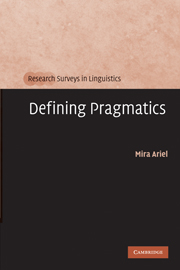Summary
If only linguistic expressions were well behaved. We would have a very neat picture of grammar versus pragmatics. Grammar would be restricted to the conventional which would simultaneously and necessarily also be context independent and truth conditional, and pragmatics would be nonconventional (inferential) and simultaneously and necessarily also context sensitive and nontruth conditional. As Recanati (2004b: 445) reminds us, however, “we can't have it both ways” for either field. Semantics can't always be both conventional and truth conditional, and pragmatics can't always be both inferential and nontruth conditional. The same applies to other criteria proposed in the literature for distinguishing grammar and pragmatics. Recanati's conclusion is that the grammar/pragmatics division of labor can be drawn absolutely only for prototypical cases. It must be stipulative for nonprototypical phenomena (such as conventional implicatures). Other linguists have applied the grammar/pragmatics division of labor inconsistently to make it work, adopting different criteria for different pragmatic questions (e.g., Horn and Ward, 2004). Many semanticists also simultaneously hold criteria which clash with one another for the complementary semantics, because they are reluctant to give up any one of them. Thus, even if context dependent, some phenomena count as semantic for some researchers, if they are truth conditional (Recanati, 2004b). Yet other linguists have given up on the grammar/pragmatics division of labor altogether. The grammar/pragmatics division of labor is in trouble. We here outline a solution for the definition dilemma.
- Type
- Chapter
- Information
- Defining Pragmatics , pp. xiii - xivPublisher: Cambridge University PressPrint publication year: 2010

